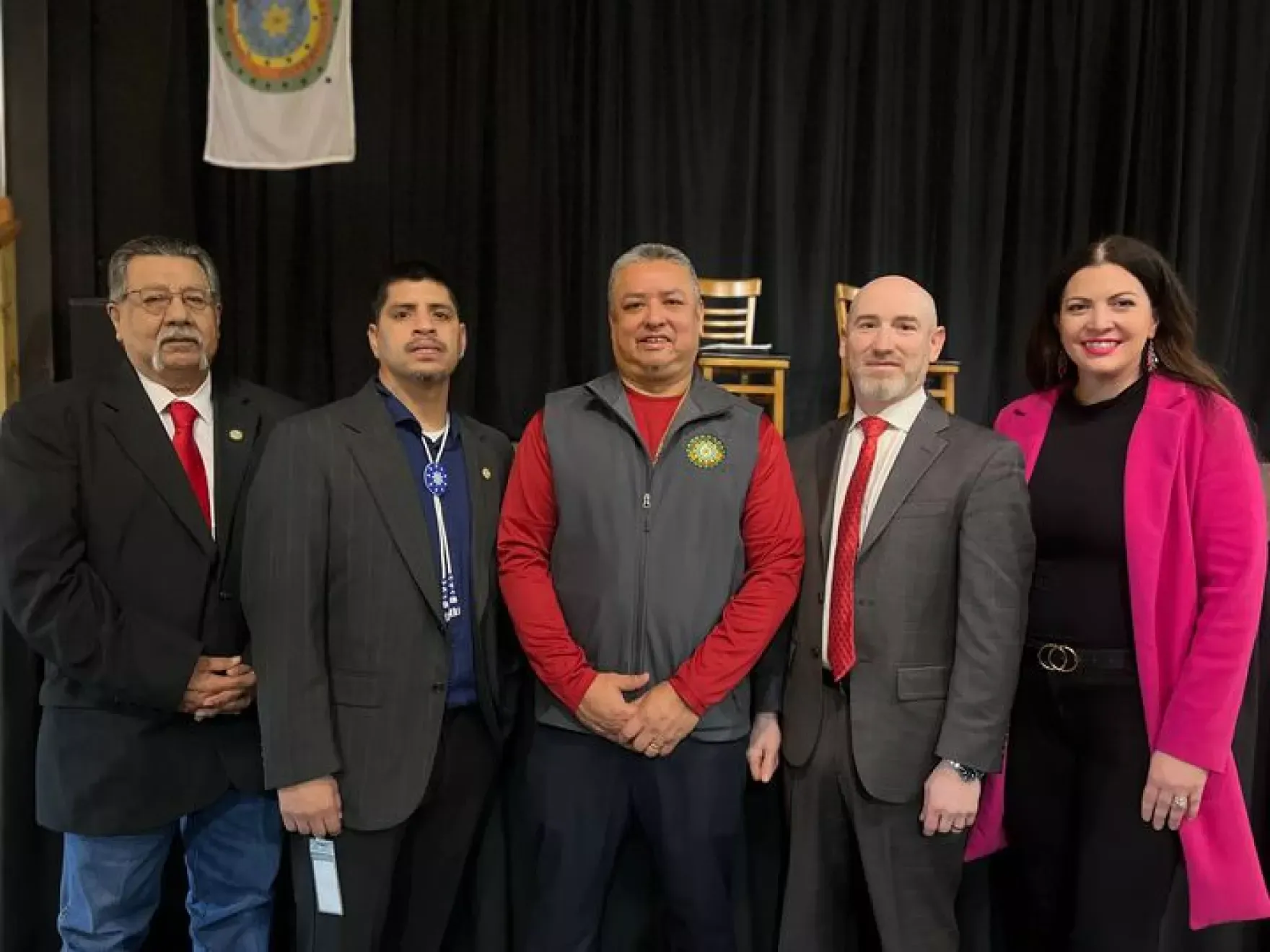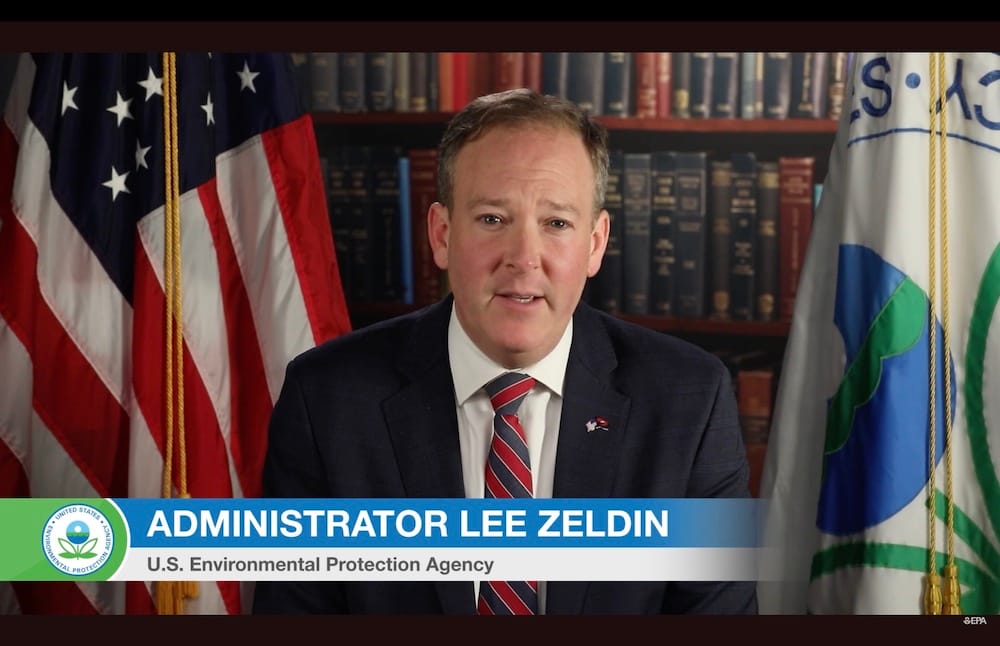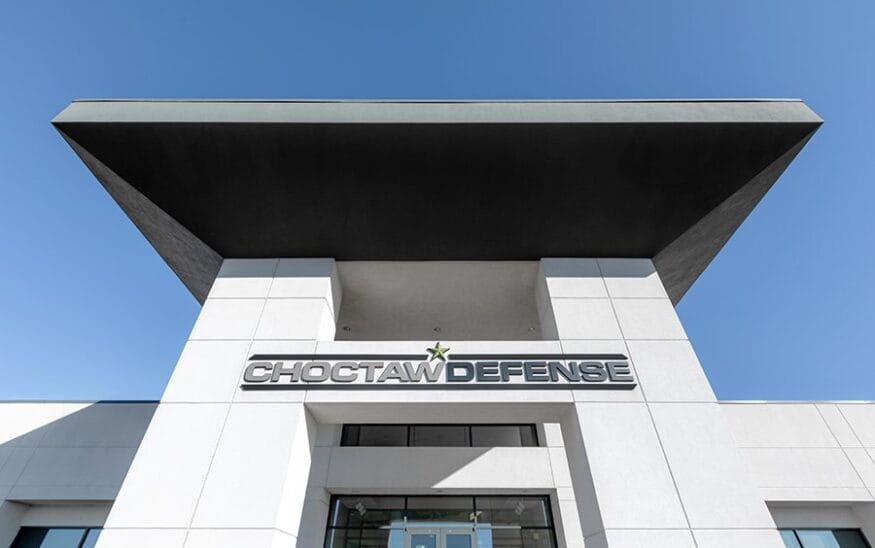

United Keetoowah Band celebrates Department of Interior opinion

By Katie Hallum (ᏧᏟ), KOSU
The U.S. Department of the Interior issued an opinion in January stating the United Keetoowah Band (UKB) is an equal successor to the Cherokee Nation’s reservation and granting the tribe the right to build a casino in Tahlequah.
UKB members gathered on Friday to celebrate the opinion where they shared food, fellowship and heard from recently elected Chief Jeff Wacoche.
“This recognition is more than a legal affirmation, which it is, but it also is a testament to the resilience and strength of the Keetoowah people,” he said in an address to the crowd. “Our ancestors endured hardships—yet they deserve our culture, our language and our sovereignty. It is upon their steadfast foundation that we now stand in raising new horizons and moving swiftly toward our future as equal successors to the historic Cherokee Nation.”
The ruling had sparked controversy between the two tribes, who recently clashed over jurisdictional agreements.
Despite their disagreements, Wacoche said the opinion offers a new horizon for the tribes.
“The UKB will always extend an offer of collaboration to our brothers and sisters of the Cherokee Nation of Oklahoma, despite their opposition to progress together,” he said. “We have a renewed opportunity to forge a partnership that honors our shared heritage and serves all Cherokee people.”
UKB Congressional Delegate and attorney Victoria Holland said the decision was a long time coming.
“It’s an exciting time for the UKB,” she said. “We have been saying for decades that we share in the Cherokee reservation, and it's nice to have something in writing from the United States that supports that position.”
When the opinion was first announced, the Cherokee Nation argued the UKB should not have authority on the reservation and vowed to fight it with Oklahoma’s congressional delegation.

Muscogee Nation: Over 200 Native programs and grants feel chill of federal funding freeze

MCN departments still under Executive Order spending caps and hiring hold
by Meredith Johnson, Mvskoke Media
OKMULGEE, Okla. – The following is a non-exhaustive list of federal grants and programs applicable for Federally Recognized Tribes, State Recognized Tribes, American Indian communities, and Tribal Colleges. On Jan 27, the White House Office of Budget Management issued a memo freezing all federal grants and programs. On Jan 28, Principal Chief David Hill issued Executive Order 25-11 putting into place spending caps for the MCN government offices. While the White House memo was rescinded on Jan. 29, the programs and grants are up for review, according to White House Press Secretary Karoline Leavitt. As of press time, Chief Hill has not made a further statement or cancelled his EO on the MCN spending freeze.
The reported list of 2,600 total programs and grants showed the enormous depth and breadth of federal funding. MVSKOKE Media reviewed the list and has consolidated for all programs and grants particular for Indian Country. The over 200 programs and grants hit nearly every MCN department from grants for the Justice Department and Tribal Court, Child and Adult Food Services, Housing Block Grants, and Higher Education.
AGRICULTURE
Bipartisan Infrastructure Law State, Private & Tribal Agreements
Indian Tribes and Tribal Corporation Loans
New Beginning for Tribal Students
Tribal Agriculture Technical Assistance
Tribal Colleges Education Equity Grants
Tribal Colleges Endowment Program
Tribal Colleges Extension Programs
Tribal Youth & Workforce Development
Tribal Broadband Connectivity Program
1994 Institutions Research GrantsAmerican Rescue Plan Centers of Excellence for Meat and Poultry Processing and Food Safety Research and Innovation Phase III
Bipartisan Infrastructure Law State, Private & Tribal Agreements
Child and Adult Care Food Program
Child Nutrition Discretionary Grants Limited Availability
Child Nutrition-Technology Innovation Grant
Children, Youth and Families At-Risk
Food Distribution Program on Indian Reservations
Food Distribution Program on Indian Reservations (FDPIR) Nutrition Paraprofessional Training
Food Distribution Program on Indian Reservations Nutrition Education Grants
Indian Tribes and Tribal Corporation Loans
COMMERCE
MBDA Business Center – American Indian and Alaska Native
EDUCATION
American Indian Vocational Rehabilitation Services
Indian Education Grants to Local Educational Agencies
Indian Education: Special Programs for Indian Children
Tribally Controlled Postsecondary Career and Technical Institutions
ENERGY
HEALTH
Cancer Prevention and Control Programs for State, Territorial and Tribal Organizations Improving the Capability of Indian Tribal Governments to Regulate Environmental Quality
Demonstration Projects for Indian Health
Good Health and Wellness in Indian Country
Health Professions Pre-Graduate Scholarship Program for Indians
Health Professions Preparatory Scholarship Program for Indians
Health Professions Recruitment Program for Indians
Improving the Capability of Indian Tribal Governments to Regulate Environmental Quality
Indian Health Service Behavioral Health Programs
Indian Health Service Community Health Aide Program
Indian Health Service Domestic Violence Prevention Programs
Indian Health Service Educational Loan Repayment
Indian Health Service Sanitation Facilities Construction Program
- Indian Health Service, Health Management Development Program
- Indian Self-Determination
- Injury Prevention and Control Research and State and Community Based Programs
- Injury Prevention Program for American Indians and Alaskan Natives Cooperative Agreements
- National Family Caregiver Support, Title VI, Part C, Grants to Indian Tribes And Native Hawaiians
- Special Diabetes Program for Indians Diabetes Prevention and Treatment Projects
- Special Programs for the Aging, Title VI, Part A, Grants to Indian Tribes, Part B, Grants to Native Hawaiians
- Stephanie Tubbs Jones Child Welfare Services Program
- Strengthening the Nation’s Public Health System through a National Voluntary Accreditation Program for State, Tribal, Local and Territorial Health Departments
- Tribal Maternal, Infant and Early Childhood Home Visiting
- Tribal Public Health Capacity Building and Quality Improvement Umbrella Cooperative Agreement
- Tribal Self-Governance Program: IHS Compacts/Funding Agreements
- Tribal Self-Governance Program: Planning and Negotiation Cooperative Agreement
- Tribal Work Grants
- Urban Indian Health Services
- Indian Community Development Block Grant Program
- Indian Housing Block Grants
- Office of Native American Programs Training and Technical Assistance for Indian Housing Block Grant Program
- Public and Indian Housing Indian Loan Guarantee Program
DEPARTMENT OF HOMELAND SECURITY
State and Local Cybersecurity Grant Program Tribal Cybersecurity Grant Program
Tribal Cybersecurity Grant Program
Tribal Homeland Security Grant Program
Title VI Federal Guarantees for Financing Tribal Housing Activities
Tribal HUD-VA Supportive Housing Program
JUSTICE
Children’s Justice Act Partnerships for Indian Communities
Grants to State and Tribal Courts to Implement Protection Order Pilot Programs
Tribal Civil and Criminal Legal Assistance Grants, Training and Technical Assistance Tribal Domestic Violence and Sexual Assault Coalitions Grant Program
Tribal Sexual Assault Services Program
Tribal Special Assistant United States Attorneys
Tribal Special Criminal Jurisdiction Reimbursement
Violence Against Women Discretionary Grants for Indian Tribal Governments
VOCA Tribal Victim Services Set-Aside Program
National Clearinghouse on Sexual Assault of American Indian and Alaska Native Women
Violence Against Women Discretionary Grants for Indian Tribal Governments
INTERIOR
Administrative Cost Grants for Indian Schools
Assistance to Tribally Controlled Community Colleges and Universities
Bureau of Indian Affairs Facilities Operations and Maintenance
Consolidated Tribal Government
Cultural Resources Management (Bureau of Indian Affairs)
Cultural Resources Management (Bureau of Reclamation)
Cultural Resources Management (National Park Service)
Endangered Species on Indian Lands
Environmental Management Indian
Federal Oil and Gas Royalty Management State and Tribal Coordination
Improvement and Repair of Indian Detention Facilities
Indian Child and Family Education
Indian Child Welfare Act Title II Grants
Indian Community Fire Protection
Indian Education Assistance to Schools
Indian Education Facilities, Operations, and Maintenance
Indian Education Higher Education Grant
Indian Graduate Student Scholarships
Indian Job Placement United Sioux Tribes Development Corporation
Indian Loans Economic Development
Indian Schools Student Transportation
Indian Self-Determination Act Contracts, Grants and Cooperative Agreements
Indian Self-Determination Contract Support
Indian Social Services Welfare Assistance
Indian Tribal Water Resources Development, Management, and Protection
Indian Vocational Training United Tribes Technical College
Litigation Support for Indian Rights
Minerals and Mining on Indian Lands
Native American Business Development Institute
Native American Graves Protection and Repatriation Act
Native Language Immersion Grant
Office of the Special Trustee for American Indians, Field Operations
Real Estate Programs Indian Lands
Replacement and Repair of Indian Schools
Safety of Dams on Indian Lands
Services to Indian Children, Elderly and Families
Water Resources on Indian Lands
Indian employment credit
Indian Environmental General Assistance Program (GAP)
Superfund State and Indian Tribe Combined Cooperative Agreements (Site-Specific and Core)
Superfund State and Indian Tribe Core Program Cooperative Agreements
Superfund State, Political Subdivision, and Indian Tribe Site-Specific Cooperative Agreements
Tribal Courts Trust Reform Initiative
Tribal Electrification Program
Tribal Energy Development Capacity Grants
Tribal Great Lakes Restoration Initiative
Tribally Controlled Community College Endowments
TREASURY
Local Assistance and Tribal Consistency Fund
Tribal Economic Development Bonds
TRANSPORTATION
Formula Grants for Rural Areas and Tribal Transit Program
Rural and Tribal Assistance Pilot Program.
Direct Implementation Tribal Cooperative Agreements
ENVIRONMENTAL PROTECTION AGENCY
State and Tribal Indoor Radon Grants
State and Tribal Response Program Grants
Water Pollution Control State, Interstate, and Tribal Program Support
DEPARTMENT OF LABOR
Native American Employment and Training
DEPARTMENT of VETERANS AFFAIRS
Native American Veteran Direct Loan Program
SMALL BUSINESS ADMINISTRATION
NATIONAL MUSEUM AND LIBRARY SCIENCES
National Archives Reference Services Historical Research
National Historical Publications and Records Grants
NATIONAL ENDOWMENT FOR THE HUMANITIES
Promotion of the Humanities Professional Development
Promotion of the Humanities Public Programs
Promotion of the Humanities Research
Native American and Native Hawaiian Library Services
Native American/Native Hawaiian Museum Services Program
Morris K. Udall Native American Congressional Internship Program
EPA moves to seize $20B in clean energy grants, including $1.5B for Native communities

By Brian Edwards, Tribal Business News
EPA Administrator Lee Zeldin announced plans to investigate and try to claw back $20 billion in clean energy grants awarded through the Greenhouse Gas Reduction Fund (GGRF), including about $1.5 billion earmarked for tribal communities — a move experts say will likely face court challenges.
Zeldin on Wednesday called for the termination of an agreement with the federal government’s financial agent, widely believed to be Citibank, where the funds have been deposited for eight organizations selected for two GGRF programs to finance clean energy projects. In a video statement, Zeldin said EPA needs to reassume responsibility for the funds and provide oversight for the programs.
“This scheme was the first of its kind in EPA history, and it was purposefully designed to obligate all of the money in a rush job with reduced oversight,” Zeldin said, adding that he would refer the matter to the EPA's inspector general’s office and that he plans to “work with the Justice Department” as well.
Senator Ed Markey (D-Mass.), who helped create the GGRF legislation, defended the funding arrangement, noting that financial agency agreements have been used by the U.S. Treasury since the 1860s. “Congress passed a law with a majority of votes that directed the Environmental Protection Agency to establish a national clean financing network,” Markey said in a statement. “The EPA followed the law...and entered into legally binding contracts with grant recipients.”
Cheri Smith, president and CEO of the Alliance for Tribal Clean Energy, quickly condemned the EPA's move, calling it “an egregious attempt to undermine legally allocated funding” and “a direct attack on tribal sovereignty.”
The Greenhouse Gas Reduction Fund's so-called “green bank” programs — the $6 billion Clean Communities Investment Accelerator (CCIA) and the $14 billion National Clean Investment Fund (NCIF) — aim to finance clean energy projects in underserved areas, with nearly $1.5 billion earmarked for tribal communities. The Native CDFI Network received $400 million to support Native communities, according to prior Tribal Business News reporting, while Climate United Fund pledged 10% of its $7 billion award to tribes and Native communities.
Some of these funds are already being put to use. Climate United has issued millions in loans and grant funding, including $10.8 million for a trio of tribal solar projects in eastern Oregon and Idaho, according to Smith, who serves on Climate United's advisory council.
A third GGRF program — the $7 billion Solar for All program — remained under EPA control and has largely seen its funding frozen by the Trump administration despite a federal judge’s order to release the funds. Solar for All dedicated more than $500 million for funding tribal solar projects, including $156 million to Oweesta Corporation, $135.6 million to a coalition of Northern Plains tribes led by the Manda, Hidatsa and Arikara (MHA) Nation, and $62.5 million to the Tanana Chiefs Conference in Alaska.
Zeldin’s efforts to claw back the funds will not be an easy task for the federal government, according to legal and government experts.
Former EPA implementation director Zealan Hoover told Tribal Business News previously that grant agreements constitute binding legal contracts governed by federal regulations, suggesting potential legal hurdles to reclaiming the funds. “This is a legal contract (and) the United States has a long and robust history of upholding contract law across the board,” he said.
“While it's true this is the first time EPA has done this, there are provisions in the agreement to stop the flow of funds and to claw back funds where there is evidence of fraud — they have not presented any such evidence,” Hoover said in an interview today.
The banking arrangement, which follows longstanding Treasury Department precedent dating back to the 1800s, was developed over the course of a year with extensive input from career staff at EPA and Treasury, Hoover said. The EPA's Office of Inspector General received briefings “to ensure robust oversight systems were in place,” he said.
David Super, a professor of law and economics at Georgetown University Law Center, told Politico’s E&E News that if EPA shirks its contractual obligations, it could ultimately cost taxpayers more. "This isn't just a clever way of postponing the expenditures," he said. "This is a way of taking a situation in which the government is contracted for valuable services and throwing it away."
Zeldin's pledge to involve the EPA's Office of Inspector General comes at a time when the office currently lacks a permanent leader. Former EPA Inspector General Sean O'Donnell was among 17 inspectors general removed by President Trump in January, despite his office recovering more than $2 billion and filing over 60 oversight reports in 2024.
In a December podcast before his removal, O'Donnell had expressed concerns about the rapid distribution of GGRF funds to "a handful of recipients" and noted his office had received no funding to oversee the program.
An EPA spokesperson reinforced these oversight concerns, saying in an email that the Biden-Harris administration was “more worried with getting the money out the door before Inauguration Day than doing it the right way with proper financial management protocols.”
The EPA’s move to claw back the funding also comes as the Trump administration faces legal setbacks in its broader attempts to freeze federal funding. On Tuesday, a federal appeals court refused to halt an order by a federal judge in Rhode Island requiring the administration to release billions in federal grants and loans that had already been approved. In that case, more than 20 state attorneys general successfully sued to stop a widespread funding freeze.
“Tribal and other communities, clean energy advocates and lawmakers are prepared to fight this in court,” Smith of the Alliance for Tribal Clean Energy wrote in an email to Tribal Business News. “But in the meantime, we must leverage philanthropy, impact and conventional investment, and Tribal-led initiatives to keep these critical projects moving forward.”
The Greenhouse Gas Reduction Fund was created to establish a national financing network for clean energy projects in disadvantaged communities, aiming to leverage public funding for private investment in projects like solar installations and energy efficiency upgrades.
Republicans have opposed the program since its inception, passing a bill last year to repeal the fund, arguing it could support otherwise unfundable projects.
Chez Oxendine provided reporting on this story, which was updated with statements from an EPA spokesperson and Sen. Markey.
Choctaw Defense secures $10M in Navy contracts

McAlester, OK — Choctaw Defense Manufacturing, a tribally-owned contractor offering services to government and commercial contractors worldwide, has been awarded two multi-million-dollar U.S. Navy contracts for the development of weapon stands and munitions trailers.
Choctaw Defense Manufacturing was awarded a new five-year, $5.4 million contract to produce 350 Improved Weapons Assembly Stands for the Naval Air Warfare Center Aircraft Division Lakehurst (NAWCAD) and received a $4.6 million contract add-on for continued production of MHU-230 Small Munitions Trailers.
“The U.S. Navy is one of our largest customers and we are pleased to be selected as their small-business contractor for the assembly of the weapon stand and munition trailer,” said Janie Dillard, CEO of Choctaw Global, the parent company of Choctaw Defense Manufacturing. “We’ve been vital to building defense systems for over 35 years and are glad Choctaw Defense can service these growing contracts.”





